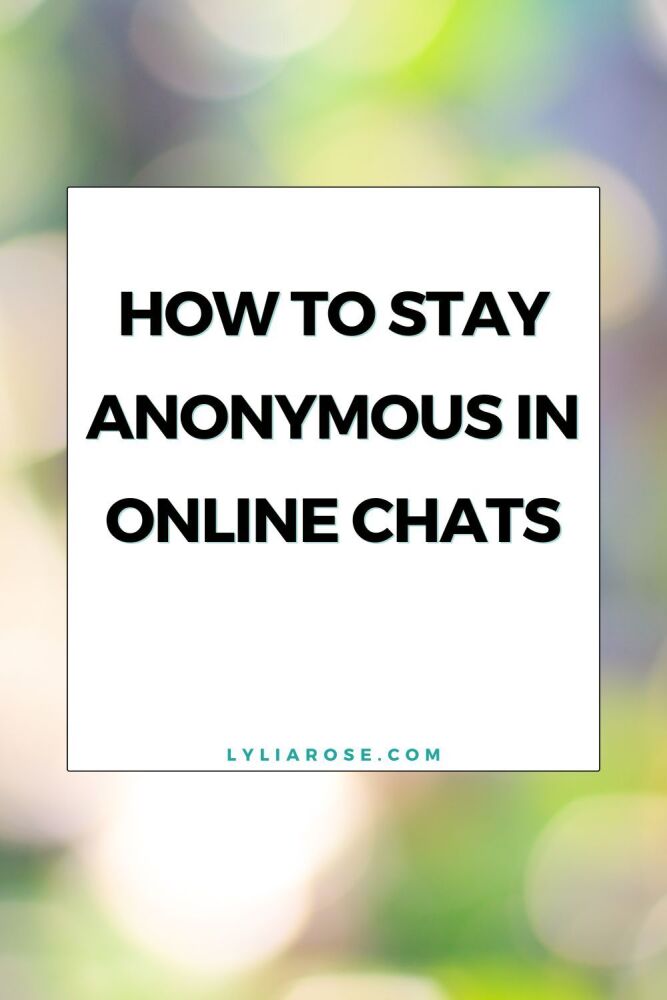How to Stay Anonymous in Online Chats
Posted on
The internet and digital communication have transformed the way we interact with others. Online messaging services have made it possible to connect with people worldwide, but they also come with potential risks to our personal information and privacy. With data breaches and identity theft on the rise, it's crucial to understand how to stay anonymous when engaging in online conversations.
Many individuals use a range of chat applications, including Signal, WhatsApp, Twitter, and Instagram. In this article, we'll delve into practical tips for preserving your anonymity while using your preferred chat services.

Choosing a Private and Secure Communication Platform
The initial step in preserving your anonymity is to select a chat platform that prioritizes security and privacy. It's crucial to opt for platforms that give utmost importance to user privacy, offer end-to-end encryption, and have a solid security track record. Well-established platforms like Telegram, Signal, and Wickr specifically prioritize user privacy and not only provide control over visibility but also ensure the confidentiality of your communications.
Selecting a Fictitious Name or Alias for Your Profile
Many chat platforms allow users to create a profile name and upload an image. When using chat apps, particularly when speaking to random people online whom you don’t know, it's advisable to opt for a nickname or a fictitious name instead of using your real name.
This practice provides an extra layer of anonymity and makes it harder for others to determine your identity. Ensure that the pseudonym you choose doesn't reveal any personal information.
Avoid Sharing Personal Information in Your Profile
As a responsible online user, adhering to the fundamental rule of maintaining online anonymity is crucial, and that starts with refraining from sharing personal information. This means avoiding the disclosure of your real name, address, phone number, or bank details during online conversations.
Instead of using a personal photograph, it's wise to opt for images of nature, pets, or food as your profile picture. Steer clear of using photos of personal objects. If you prioritize anonymity, using the default image option can help you achieve that goal.
Utilize Virtual Private Networks (VPNs)
VPNs are valuable tools that encrypt connections over public networks. They effectively conceal your IP address by assigning a different IP address from the connected VPN network, ensuring the security of your information and activities against potential hackers.
It's essential to test that your VPN is redirecting your traffic properly, an effective way to do this is to use an IP address lookup service and look at the details of the new IP address you've been assigned. If the details shown when you search this IP look like the location you selected when connected, then you can be sure that your connection is properly encrypted.
Do your research and use a reliable VPN service like ExtremeVPN or ExpressVPN to maintain your privacy during online chats.
Use Temporary Phone Numbers or Email Addresses
Skype or Telegram allows users to sign up without the need for a mobile phone number or SIM card. This feature ensures the protection of personal information in case any issues arise during communication.
Additionally, you can enhance your online anonymity further by using alias email addresses. Some email providers, like cloud-based services, allow you to create alias email addresses. These aliases serve as temporary, unique email addresses that forward messages to your primary inbox.
By using alias email addresses for online chats, you can add an extra layer of privacy, making it more challenging for others to trace your real email address back to you.
Share Only Essential Personal Details
Always remember the importance of limiting the information you share to the bare essentials. When engaging in online purchases or transactions, it's a good practice to request that all correspondence and discussions happen exclusively within the application or platform you're using. This helps maintain your privacy and security.
Use Privacy Add-ons to Prevent Tracking
It's advisable to use browser add-ons designed for privacy when engaging online. These add-ons allow you to maintain separation from your primary accounts while interacting with others on the internet. They help enhance your online anonymity and protect your personal information.
Be Cautious with Files and Links
When participating in online chats, it's vital to exercise caution, especially when dealing with shared links or downloadable files. These links and files can pose potential risks to your privacy and personal information.
To protect yourself from these risks there’s one major rule to follow: avoiding clicking on unauthorized links from untrusted sources and refraining from downloading files from unauthorized or suspicious websites. Additionally, ensuring your safety against potential threats involves using antivirus software and keeping it regularly updated.
Final word
Online privacy and safeguarding personal information should always be a top priority. By taking steps to maintain anonymity in online chats, individuals can shield themselves from the dangers of identity theft and unauthorized access to their data.
By following the advice provided above, you can significantly reduce your cyber-security risks, ensuring secure communication while preserving your anonymity.
Next, check out these cyber-security trends and how to adapt quickly!

